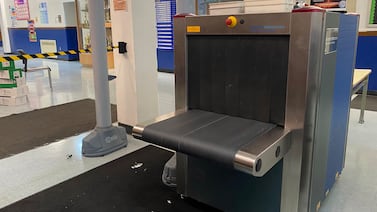Sign up for Chalkbeat Detroit’s free daily newsletter to keep up with the city’s public school system and Michigan education policy.
Transparency for charter schools is the top education policy priority for Michigan Democrats as they count down the remaining days that they have complete control of state government.
Democrats are now pushing to get nine charter school-related bills signed into law, after Republicans won control of the state House in the Nov. 5 election, leaving Democrats with control of the Senate and governor’s office. The proposed bills include requirements for charter schools to make public their salary information, financial audit statements, and lease or purchase agreements.
“It’s important because it’s fair,” Rep. Matt Koleszar, a Democrat from Plymouth who chairs the House Education Committee, said of the legislation. “We hear all the time that charter schools are public schools, so let’s put them on the same playing field as traditional public schools.”
Republicans have long opposed such legislation, saying it would add new costs and regulations for charter schools.
Dan Quisenberry, president of the charter advocacy group Michigan Association of Public School Academies, previously said charter schools are publicly accountable and transparent. He said teacher salaries, budgets, spending reports, and contracts, are already made available to their school boards, which are public entities.
Those who advocate for more transparency say charters often aggregate all expenditures into a single line item for “purchased services,” making it difficult for the public to decipher what the schools are spending money on and to compare teacher salaries. This is not the case for traditional public school districts.
Charter schools, or public school academies, are publicly funded and must follow state and federal education laws. They are operated by an outside body, or an authorizer, which is usually a college or university and sometimes a local school district. The boards that oversee charter schools are appointed by authorizers.
Many of the schools hire for-profit companies to manage their business operations. The data from those companies is not subject to the public information laws that traditional public schools are.
Five of the charter school transparency bills being considered in the coming session already passed in the House. The other four bills have not yet gone to a committee or been up for a vote in either the Senate or House.
The measures in the bills would require that:
- The names of charter schools’ authorizers and management companies be publicly listed online, on student applications, and on signage at campuses.
- Management companies operating charter schools make audited financial statements publicly available online.
- Any notices of charter schools’ noncompliance with education standards, guidelines, or rules be posted publicly.
The Senate Education Committee will hold a hearing on the bills at 11 a.m. Wednesday. The committee may vote on moving them for approval in the Senate.
Democrats have a short window to pass the bills during the lame-duck session. The narrow Republican wins in key districts mean Democrats’ short historic trifecta of control over the House, Senate, and the executive branch will end in January.
Other priorities include school safety, FAFSA requirement
Charter school transparency is the biggest remaining area of reforms advocates and Democrats had on their agenda.
Koleszar said the bills that have already passed in the House are particularly high priority to get across the finish line.
He said his other priorities for the rest of the year include bipartisan school safety legislation. The package of school safety proposals includes putting more mental health support in place for struggling students and tightening protocols for responding to emergencies.
There was a hearing for five of the bills in the House Education Committee in March. The committee has not yet moved them forward for a vote in the House.
Two bills that would require public schools to distribute information to students and families on how to safely store firearms moved out of committee and are up for votes in the House.
Another pending bill that passed in the Senate but has not yet had a hearing in the House Education Committee would make completing the Free Application for Federal Student Aid a graduation requirement.
That bill is a top priority for The Education Trust Midwest, a nonpartisan advocacy organization.
The requirement would “ensure students can access the financial aid they need to attend college,” said Jennifer Mrozowski, senior director of strategic communications for Ed Trust Midwest.
Koleszar said he personally supports the bill, but is uncertain whether it will have enough votes in the House to pass.
What education policy goals have the Democrats already accomplished?
The Democrats’ control of all three branches of state government for the first time since 1983 meant many of the issues education leaders and advocates long championed were addressed.
A bill that will permanently reduce payments from districts into the Michigan Public School Employee Retirement System and eliminate an employee contribution requirement passed in October.
“It really is a monumental and permanent step toward making sure, regardless of any individual budget, there will be more dollars in classrooms as a result of that change,” said Bob McCann, executive director of the education policy advocacy group K-12 Alliance of Michigan.
Lawmakers also made progress on funding schools more equitably, with weighted funding for districts serving more students living in poverty; they repealed the retention provision in the third-grade reading law and eliminated the A-to-F school rating system.
They passed bills to change teacher evaluations to remove student test scores as a criterion, and to restore educators’ collective bargaining rights.
Legislation to require that the “science of reading” be included in literacy instruction also passed.
Koleszar said the legislation that passed under the Democratic majority laid the foundation to address ongoing school staffing shortages, including accepting the credentials of out-of-state teachers, and changing the law to automatically enroll new educators in a pension system instead of requiring them to opt in.
What will the new House Education Committee prioritize?
The incoming speaker of the House, Matt Hall, a Republican from Kalamazoo, will appoint a new 14-member House education committee that will be in place for the next two years under a Republican chair.
The new chair will decide which education bills will get hearings, and a majority vote of the panel will decide whether legislation moves forward for votes in the full House.
Hall has not yet publicly discussed his appointment considerations.
Two Democrats who are currently on the House Education Committee — Nate Shannon of Sterling Heights and Jaime Churches of Wyandotte — both lost their seats to Republicans.
Hall, currently the House minority leader, introduced a Republican education plan in September that called for reforming requirements for teacher preparation programs at universities, expanding dual enrollment to include trade schools, and exploring alternatives to state standardized testing.
Mrozowski said equitable funding, including more money to support English language learners, will remain a top priority for Ed Trust Midwest in the next session.
“Targeting resources based on student needs is a bi-partisan issue,” she said.
Hannah Dellinger covers K-12 education and state education policy for Chalkbeat Detroit. You can reach her at hdellinger@chalkbeat.org.





